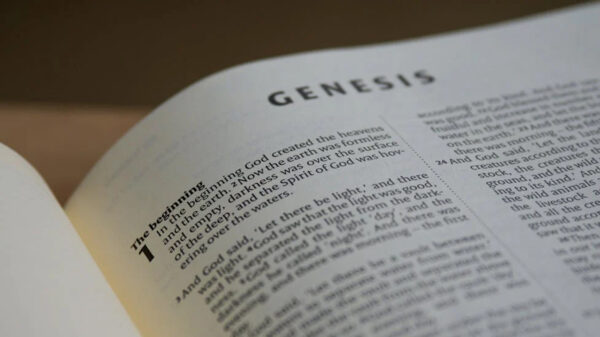
The “evidence” of scripture also contains unrelated “artifacts”. Bart Ehrman, for example, has drawn attention to the number of textual variations (artifacts) in the New Testament. In Misquoting Jesus, Ehrman describes his own descent from faith:
“There was an obvious problem, however, with the claim that the Bible was verbally inspired – down to its very words. As we learned at Moody in one of the first courses in the curriculum, we don’t actually have the original writings of the New Testament. What we have are copies of these writings, made years later, in most cases, many years later. Moreover, none of these copies is completely accurate, since the scribes who produced them inadvertently and/or intentionally changed them in places. All scribes did this. So rather than actually having the inspired words of the autographs (i.e., the originals) of the Bible, what we have are the error-ridden copies of the autographs… Not only do we not have the originals, we don’t have the first copies of the originals. We don’t even have copies of the copies of the originals, or copies of the copies of the copies of the originals. What we have are copies made later – much later. In most instances, they are copies made many centuries later. And these copies all differ from one another, in many thousands of places… The Bible began to appear to me as a very human book. Just as human scribes had copied, and changed, the texts of scripture, so too had human authors originally written the texts of scripture. This was a human book from beginning to end.”
It’s clear that Ehrman was troubled by the existence of the textual “artifacts” and eventually came to believe that he couldn’t trust any of the Biblical “evidence” that shared space on the pages of scripture. Imagine if I took that same approach to my crime scenes. If I threw my hands up every time I encountered a scene that wasn’t evidentially pure, I wouldn’t solve a single case. Every crime scene has artifacts. Get over it. That’s why we have to learn to be good detectives; it’s our job to sort through the evidence and the artifacts. We can’t just give up because the scene is less tidy than we might like.
It’s also important to recognize that Ehrman’s initial expectation of Biblical inerrancy caused him to lose confidence in the Bible once he discovered anything that didn’t belong in the text. Maybe that’s because he was raised in the Church and the teaching on inerrancy was foundational to his belief. As a 35 year old atheist detective, I came from a very different place when I first discovered the presence of scribal variations in the Biblical text. I’d already tried a number of robbery and murder suspects prior to reading the gospels. I was very familiar with the nature, texture and properties of eyewitness statements, long before I began to examine the claims of the gospel writers. My expectations of eyewitnesses were far lower than Ehrman’s. I already acknowledged two things about witnesses: they seldom agree about every detail and they are sometimes mistaken about some aspect of their testimony. In spite of this, witnesses can be deemed reliable and trusted once we do the hard work of determining why they might see something differently or incorrectly. In fact, judges in the state of California instruct juries that they are not to distrust a witness just because that witness may be wrong about some aspect of his or her testimony:
“Do not automatically reject testimony just because of inconsistencies or conflicts. Consider whether the differences are important or not. People sometimes honestly forget things or make mistakes about what they remember. Also, two people may witness the same event yet see or hear it differently” (Section 105, Judicial Council of California Criminal Jury Instructions, 2006)
Witnesses can be wrong in some aspect of their testimony, yet be considered reliable, over all. Once the jury understands why the witness might be mistaken in a detail, they are encouraged to consider the rest of the testimony reliable.
Let me be clear about something here: after examining the gospel accounts, I don’t believe that they contain any true contradictions or factual errors. I do, believe however, that they contain scribal variants, and these variants are already identified on the pages of scripture by the publishers of our modern translations. While I do believe in the inerrancy of the original text of the New Testament, I entered my examination of the gospels with a very different standard; I didn’t demand that the witnesses be inerrant, just reliable. A witness can be mistaken about some small detail, yet considered reliable related to his or her larger claims. Although it is clear that the New Testament we possess today contains “variants” that we have accurately identified by comparing over 24,000 manuscripts fragments and larger documents, this has no bearing on whether or not they are reliable. These variants may be an excuse for some to lazily dismiss the claims of scripture, but good investigators don’t have the luxury of being lazy. Instead, it’s our duty to separate the artifacts from the evidence so we can solve the case and determine what really happened at the crime scene. Similar diligence is needed if we are ever going to fairly assess the claims of Christianity.

J. Warner Wallace is a Dateline featured Cold-Case Detective, Senior Fellow at the Colson Center for Christian Worldview, Adj. Professor of Christian Apologetics at Talbot School of Theology, Biola University, author of Cold-Case Christianity, God’s Crime Scene, and Forensic Faith, and creator of the Case Makers Academy for kids.
Subscribe to J. Warner’s Daily Email
Save
J. Warner Wallace is a Dateline featured cold-case homicide detective, popular national speaker and best-selling author. He continues to consult on cold-case investigations while serving as a Senior Fellow at the Colson Center for Christian Worldview. He is also an Adj. Professor of Christian Apologetics at Talbot School of Theology, Biola University, and a faculty member at Summit Ministries. He holds a BA in Design (from CSULB), an MA in Architecture (from UCLA), and an MA in Theological Studies (from Gateway Seminary).







































Pingback: The Gospels Are Reliable, Even with Many Redactions | DefendingChrist.org
Pingback: The Case for Christianity, Unrealistic Expectations and Evidential Modesty
Pingback: The Gospels Are Reliable Even With Many Redactions | Cold Case Christianity
Pingback: Unbelievable? Is Luke's Description of Quirinius Historically Inaccurate? | Cold Case Christianity
Pingback: Can We Trust the Early Traditions of Apostolic Martyrdoms? | Cold Case Christianity
Pingback: Is Luke's Description of Quirinius Historically Inaccurate?
Pingback: On Williams and Ehrman - After Economics